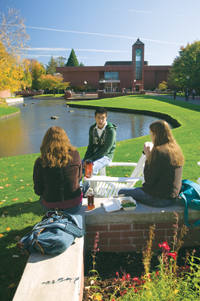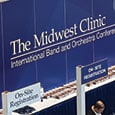 This past summer I gave a masterclass for Patricia George’s flute students at the Sewanee Summer Music Festival. While there, I spoke to all of the the high school and college students, not just the flutists, about their futures. It occured to me that other students might benefit from the same message. Your future is before you, and there are so many decisions to be made during the next few years. As you select a college or make choices about life after school, consider these words based on my years of experience.
This past summer I gave a masterclass for Patricia George’s flute students at the Sewanee Summer Music Festival. While there, I spoke to all of the the high school and college students, not just the flutists, about their futures. It occured to me that other students might benefit from the same message. Your future is before you, and there are so many decisions to be made during the next few years. As you select a college or make choices about life after school, consider these words based on my years of experience.
I didn’t wake up one morning at age 18 and say, “Someday I want to be the editor of Flute Talk.” Life isn’t like that. My life has been a series of progressions, changing as opportunities arose. Keeping an open mind, being aware, and exploring new opportunities has led me through a diverse set of circumstances, most of which I was prepared for because I kept my options open.
I believe that life is what you make of it. There are options throughout the journey, and the decisions that you make, whether large or small, influence the rest of your life. Life altering decisions might include a choice of teacher, course selections in high school and college, how much to practice, whether to practice or do the math homework that was due three days ago. You get the idea.
Some of the choices I made as a teenager were good and some were less than informed. That I chose to pursue both flute and keyboards was a good decision. I have earned a living with both instruments. On the minus side, I chose not to take advanced math or science courses in high school. I never even took chemistry. Even my father, a high school biology teacher, encouraged me to omit chemistry from my curriculum. I was going to be a musician; I didn’t need chemistry. That decision limited my future options. I really enjoyed an introductory geology course in college, but was unable to take any further geology courses because high school chemistry was a prerequisite.
Music Theory
Another example is my college transcript, which says that I have a minor in music theory. However, that is not quite accurate. I have perfect pitch and chose to do all the theory assignments by ear, without learning any rules. I checked the assignments for parallel fifths and octaves before turning them in and received straight As. I didn’t learn a thing. That choice came back to haunt me. Thirty years later, while teaching flute at Wheaton College, the dean asked me to fill in for a theory professor for one semester. I did it, working very hard to stay one step ahead of the students. I wish I had learned music theory in college in the first place or had not accepted the position in the second. I wasn’t a very good theory teacher.
Music History
In college, I felt that music history was a set of required courses to be gotten through. I did the work, got As, but really just studied for the exams. When they were over, all those little details flew right out of my head. I never understood why I had to memorize dates and names of treatises. If I needed to know that stuff, I knew where to look it up. I only realized years later that in order to teach well, particularly at the college level, you really need a good working knowledge of music history. How are you going to explain Baroque ornamentation to a flute student if you don’t understand the relationship between it and Renaissance performance practice?
Professional Decisions
In the 1970s, DePaul University offered faculty members a computer purchase program. I remember much discussion at home about whether I would ever need computer skills, but eventually we decided to enroll in the program. That decision was certainly a wise one. Several years later I taught myself Finale, opened a desk-top publishing company, and produced many flute choir arrangements, many of which are still performed today.
Throughout my education I attended summer music camps, such as the Aspen Music Festival and the National Woodwind Workshop, where I met other students and studied with such notable teachers as Julius Baker and Albert Tipton. I chose to stay in touch with those people, and over the years, and it has been fun to watch their careers rise. Piccolo guru Jan Gippo was one of those students. The option to attend these programs and establish friendships with other musicians was rewarding at the time and has continued to help me now. My job at Flute Talk would not be possible without the relationships established during those formative years.
Music students learn to organize, meet deadlines, and see to details. These abilities may be the most important skills that you take away from music lessons. You may not go on to be a professional musician, but you will be well prepared to pursue a career as a doctor, lawyer, or journalist because you have learned to deal with minutiae while playing the flute.
A few thoughts in closing
• Keep an open mind.
• Don’t be afraid to take chances.
• Remain open to new ideas.
• Apply yourself to your academic
course work. You may need it some day.
• Learn music history and theory.
• Stay in touch with your musical friends.
• First impressions are lasting ones.
• Honesty and integrity are essential.
• Pay attention to details.
• Be on time to lessons.
• Meet deadlines.
• Get a well-rounded education.
– Victoria Jicha, Editor






